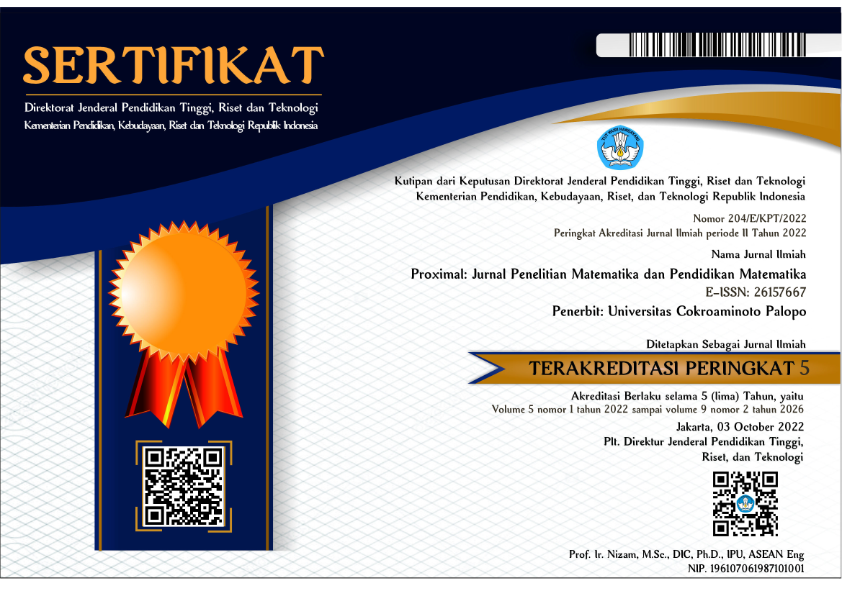PENGARUH SUBJECTIVE WELL BEING DIMASA PANDEMI COVID-19 TERHADAP HASIL BELAJAR MATEMATIKA SISWA SEKOLAH DASAR
DOI:
https://doi.org/10.30605/proximal.v4i2.1356Keywords:
Subjective Well Being, Hasil Belajar MatematikaAbstract
Pandemic covid 19 mempengaruhi sebagian besar aspek dalam dunia Pendidikan termasuk pendidikan dasar. Salah satu aspek yang terdampak dari perubahan ini adalah hasil belajar. Hasil belajar dimasa pandemic ini dipengaruhi beberapa faktor di antaranya Subjective Well Being. Penelitian ini bertujuan untuk mengetahui gambaran Subjective Well Being dan hasil belajar matematika siswa Sekolah Dasar dimasa pandemi Covid-19 dan untuk mengetahui pengaruh Subjective Well Being terhadap Hasil Belajar Matematika siswa Sekolah Dasar di masa pandemik Covid-19. Jenis penelitian ini adalah ex-post facto. Pada penelitian ini yang menjadi populasi adalah seluruh Siswa Sekolah Dasar yang terdapat di Kecamatan Malili, Kabupaten Luwu Timur, Porvinsi Sulawesi Selatan dan sampelnya 360 orang siswa kelas IV SD dengan cara Purposive sampling. Data Subjective Well Being diperoleh menggunakan angket dan hasil belajar matematika menggunakan tes. Analisis data yang digunakan adalah analisis deskriptif untuk mendeskripsikan karakteristik masing-masing variabel dan analisis inferensial untuk menguji hipotesis penelitian digunakan uji regresi. Hasil penelitian menunjukkan bahwa Subjective Well Being siswa Sekolah Dasar dimasa pandemi Covid-19 berada pada kategori sedang dan Hasil Belajar Matematika siswa Sekolah Dasar dimasa pandemi Covid-19 berada pada kategori sedang. Terdapat pengaruh Subjective Well Being terhadap Hasil Belajar Matematika siswa Sekolah Dasar dimasa pandemi Covid-19.
Downloads
References
Compton, W. C. (2000). Meaningfulness as a mediator of Subjective Well Being. Psychological reports, 87(1), 156-160.
Diener, E. (2000). Subjective Well-Being The Science of Happiness and a Proposal for a National Index. American Psychological Association Vol.LV (1), 34.
Fauzi, I., & Khusuma, I. H. S. (2020). Teachers’ Elementary School In Online Learning Of Covid-19 Pandemic Conditions. Jurnal Iqra’: Kajian Ilmu Pendidikan, 5(1), 58-70.
Froh, J. J., Franklin, B., & Templeton, J. (2009). Happiness. The Encyclopedia Of Positive Psychology, 1, 455-461.
Hudaifah, F. (2020). The Role of Self Regulated Learning in The Covid-19 Pandemic Era.Biormatika: Jurnal ilmiah fakultas keguruan dan ilmu andemic n, 6(02), 76-84.
Maddux, J. E. (2018). Subjective Well Being and life satisfaction: An introduction to conceptions, theories, and measures. Routledge/Taylor & Francis Group
O’Connor, R. (1993). Issues in the measurement of health related quality of life. Australia.
Ramadhani, D. (2017). Efektivitas Bimbingan Gratitude Untuk Meningkatkan Subjective Well Being Peserta Didik (Doctoral dissertation, Universitas Pendidikan Indonesia).
Shoshani, A., & Steinmetz, S. (2014). Positive psychology at school: A school-based intervention to promote adolescents’ mental health and well-being. Journal of Happiness
Studies, 15(6), 1289-1311.
Silvia, A. R. (2018). Efektivitas Teknik Coaching Untuk Peningkatan Psychological Well-Being Siswa (Doctoral dissertation, Universitas Pendidikan Indonesia).
Wijayanti, P. A. K., Pebriani, L. V., & Yudiana, W. (2019). Peningkatan Subjective Well-Being In School Pada Siswa Melalui “Peer Support And Teaching Method Program”. Journal of Psychological Science and Profession, 3(1), 31-42.
Zakiyah, Z. (2020). Hubungan Antara Subjective Well Being Dengan Hasil Belajar Biologi Siswa Kelas X Sma Nuraida Islamic Boarding School (NIBS) Bogor. Jurnal Teknologi
Pendidikan, 9(1).
Downloads
Published
How to Cite
Issue
Section
License
In submitting the manuscript to the journal, the authors certify that:
- They are authorized by their co-authors to enter into these arrangements.
- The work described has not been formally published before, except in the form of an abstract or as part of a published lecture, review, thesis, or overlay journal.
- That it is not under consideration for publication elsewhere,
- That its publication has been approved by all the author(s) and by the responsible authorities – tacitly or explicitly – of the institutes where the work has been carried out.
- They secure the right to reproduce any material that has already been published or copyrighted elsewhere.
- They agree to the following license and copyright agreement.
License and Copyright Agreement
Authors who publish with this journal agree to the following terms:
- Authors retain copyright and grant the journal right of first publication with the work simultaneously licensed under Creative Commons Attribution License (CC BY 4.0) that allows others to share the work with an acknowledgment of the work's authorship and initial publication in this journal.
- Authors are able to enter into separate, additional contractual arrangements for the non-exclusive distribution of the journal's published version of the work (e.g., post it to an institutional repository or publish it in a book), with an acknowledgment of its initial publication in this journal.
- Authors are permitted and encouraged to post their work online (e.g., in institutional repositories or on their website) prior to and during the submission process, as it can lead to productive exchanges, as well as earlier and greater citation of published work.















